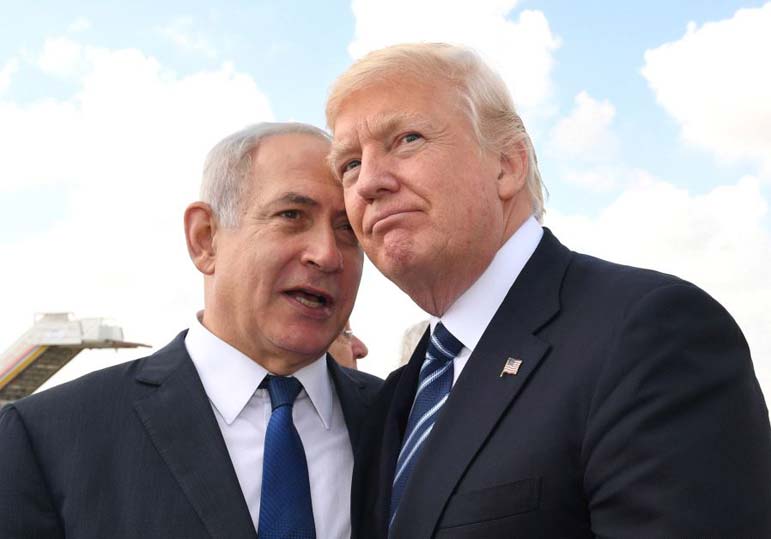
When Israel's Prime Minister Benjamin Netanyahu was last in Washington, he had reason to smile. Sitting alongside President Donald Trump at the White House, the Israeli leader smirked as his American counterpart stunned onlookers with his quixotic plans to take over the devastated Gaza Strip and transform it into a luxury tourist destination.
At a time when regional diplomats were struggling to thrash out a viable "day after" strategy for the territory, Trump's vision was a gift to Netanyahu. It suggested the mass emigration of Gaza's beleaguered population - something many in the Israeli right want to see - and offered nothing about the prospects of a future Palestinian state or the current absence of equal rights for Palestinians living under Israeli occupation.
Netanyahu is slated to return to the White House on today, and he comes at a more challenging moment. The impetus of the visit is Trump's new 17 percent tariffs on Israeli exports, a move that took Netanyahu and his colleagues by surprise last week and came in the face of Israel's preemptive decision to drop tariffs on U.S. goods. The Israeli leader, an opponent of the Iranian regime, may also want to get across his concerns about the Trump administration's attempts to restart diplomacy with Tehran and discuss the situation in Syria - where Israel has systematically bombed various targets, provoking a deepening rift with Turkey.
Netanyahu is faced with mounting crises at home. He was expected to deliver testimony this week at an ongoing corruption trial. He's also battling two parallel scandals - an investigation into payments made by Qatar to top Netanyahu associates and the political clash that's surrounded his controversial ousting of Ronen Bar, the head of the Shin Bet, Israel's domestic security agency. On Friday, Bar submitted a letter as part of a high court petition against his dismissal where he suggested Netanyahu deliberately prolonged the war in Gaza to preserve his ruling coalition with allies and distract the public from his own legal travails.
Not surprisingly, the Israeli leader is happier playing global statesman, a role he burnishes every time he comes to the United States. But storm clouds hang over his travels abroad, too. During a state visit to Hungary this past week, Hungarian Prime Minister Viktor Orban - who promotes a style of government he calls "illiberal democracy" - withdrew his nation from the International Criminal Court, calling it a "political court" during a joint news conference with Netanyahu. There's an outstanding ICC warrant for Netanyahu's arrest for alleged war crimes, including using "starvation as a method of war."
The slaughter comes amid a broader campaign waged by Israel since the collapse of the ceasefire with [terrorist] group Hamas last month. The United Nations said that, on average, 100 children in Gaza have been killed every day since Israel resumed operations on March 18, pummeling Gaza with more airstrikes and bombardments in a bid to further punish Hamas, which launched a brazen attack on Israel on Oct. 7, 2023.
Israeli officials seem unmoved. The military operations in Gaza are "expanding, involving the broad evacuation of the Gazan population from combat zones," Defense Minister Israel Katz said in a statement last week. They will also include "the destruction and clearing of the area of terrorists and terror infrastructure, and the seizure of large areas to be added to Israel's security zones to protect our fighting forces and communities."
Last week, Netanyahu said that Israeli ground forces were establishing a new security "corridor" in southern Gaza after further displacing civilians and razing infrastructure in the hollowed-out ruins of Rafah, the southernmost Gazan city that was once the hub of humanitarian operations in the territory. In the face of domestic and international critics who feared the ongoing campaign was endangering the lives of the remaining hostages in Hamas captivity, Netanyahu has insisted that the current maneuvers will force Hamas to release its captives.
But what's unfurling right now may hasten a different scenario rejected by Israel's Arab neighbors and many governments in the West. "We will see to the general security in the Gaza Strip and will allow the realization of the Trump plan for voluntary migration," Netanyahu said on social media last week. "This is the plan. We are not hiding this and are ready to discuss it at any time."
(COMMENT, BELOW)


 Contact The Editor
Contact The Editor
 Articles By This Author
Articles By This Author